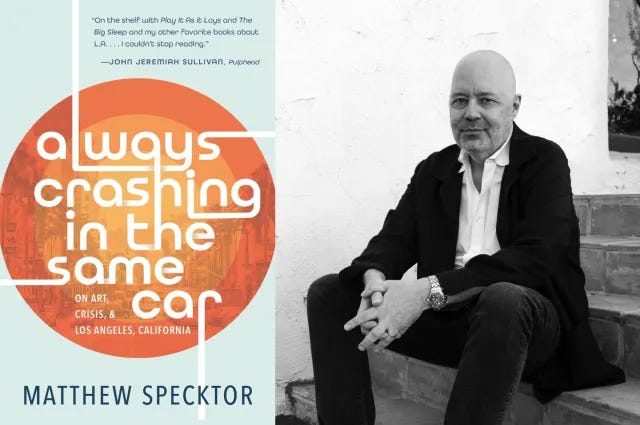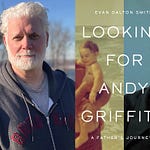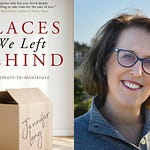In this episode, I talk with author and novelist
about his recent hybrid memoir and cultural exploration, Always Crashing in the Same Car. We discuss his fascination with figures who faced creative crises in Hollywood, from F. Scott Fitzgerald, filmmaker Hal Ashby or musician Warren Zevon to more overlooked but similarly brilliant figures like Carole Eastman, the screenwriter of the 1970s classic Five Easy Pieces.We also explore the realities of growing up in LA, including being “celebrity-adjacent.” That’s perhaps best illustrated by the time Marlon Brando left an incredible monologue in the form of a voicemail. We do a deep dive into the attraction of hybrid memoir for fiction writer, Matthew’s approach to research, and whether it’s possible any longer to be a middle-class creative in Hollywood.
“All of those kind of impulses fused in me, and eventually, and I sort of realized, like, oh, this is what I want to write. I want to write a book that's a memoir that isn't about me, or a memoir that's only kind of, you know, partly about me.”
Key Takeaways
Always Crashing In the Same Car pays homage to figures who've faced both genius and marginalization in Hollywood, including Thomas McGuane, Renata Adler, Carole Eastman, Eleanor Perry, Hal Ashby, Michael Cimino, Warren Zevon & more. The book is about “those who failed, faltered, and whose triumphs are punctuated by flops...”
Matthew shares his fascination with Carol Eastman, best known for Five Easy Pieces. He was deeply touched by her prose writings, comparing her to poets like Hart Crane and Wallace Stevens.
The book and the interview also delves more deeply into women's contributions to Hollywood, focusing on other overlooked talents like Eleanor Perry and Elaine May. Matthew reflects on his mother, a one-time screenwriter, and how her generation had less opportunity to develop their skills.
Why a hybrid memoir? Matthew was reading, and inspired by, writers like Hilton Als, Heidi Julavits, and Olivia Laing. He wanted to create a narrative that wasn’t limited to—or rather moved beyond—the self, weaving together cultural criticism about Hollywood and creative crises.
We talk a lot about voice, which Matthew says is crucial for him to discover early on. “Once I can locate the voice for any piece of writing... I have it in the pocket,” he says. The narrator of this book blends personal reflections with a noir quality, he says.
Matthew sees himself as a novelist at heart. He considers the narrative tools of a novelist indispensable, even when writing memoirs and cultural critiques: “I am fundamentally a novelist….I think that's part of being a fiction writer or novelist is, you know, anything that you write is a kind of criticism in code. You're always responding to other texts.”
Matthew begins by explaining his unique research style: "I'm kind of ravenous and a little deranged about it…” His research process involves intuitive dives, like a two-day blitz through Carol Eastman's archives.
The discussion also touched on Matthew's upbringing with a mom who was a one-time screenwriter and who crossed the picket line during one writer’s strike, and his father, who had modest beginnings but went on to become a famous Hollywood “superagent” representing Marlon Brando, Morgan Freeman, Helen Mirren & many others.
At the same time, Matthew explores misconceptions around Hollywood glitz, addressing the middle-class reality of many involved in the film industry. For a long-time, Hollywood could support such middle-class creatives, Matthew contends, something that is no longer really possible.
Addressing the evolution of the entertainment industry, Matthew notes the shift towards debt servicing, influenced by corporate acquisitions. This financial pragmatism often overrides the creative impulse, squeezing the middle class out.
Another takeaway? The creative world, especially in Hollywood, is fraught with periods of drift and struggle. In one sense, Always Crashing In the Same Car is a love letter to that state of things.

"I still kind of think of [Always Crashing…] as being secretly a novel. Not because it's full of made up shit…but because I think sometimes our idea of what a novel is is pretty limited. You know, there's no reason why a novel can't be, like, 98% fact."
About Matthew Specktor
Matthew Specktor’s books include the novels That Summertime Sound and American Dream Machine, which was long-listed for the Folio Prize; the memoir-in-criticism Always Crashing in The Same Car: On Art, Crisis, and Los Angeles, California, and The Golden Hour, forthcoming from Ecco Press. Born in Los Angeles, he received his MFA in Creative Writing from Warren Wilson College in 2009. His writing has appeared in the New York Times, GQ, The Paris Review, Tin House, Black Clock, and numerous other periodicals and anthologies. He is a founding editor of the Los Angles Review of Books.
Resources:
Books by Matthew Specktor:
Referenced on this episode:
The Women, by Hilton Als
Low, by David Bowie
The Great Gatsby, This Side of Paradise, The Last Tycoon, The Pat Hobby Stories, and The Crack-Up, by F. Scott Fitzgerald
F. Scott Fitzgerald on Writing, edited by Larry W. Phillips
The Folded Clock: A Diary, by Heidi Julavits
The Lonely City, by Olivia Laing
300 Arguments, by Sarah Manguso
“Bombast: Carole Eastman,” by Nick Pinkerton
“The Life and Death of Hollywood,” by Daniel Bessner, Harper’s, May 2024.
Credits
This episode was produced by Magpie Audio Productions. Theme music is "The Stone Mansion" by BlueDot Productions.
















Share this post